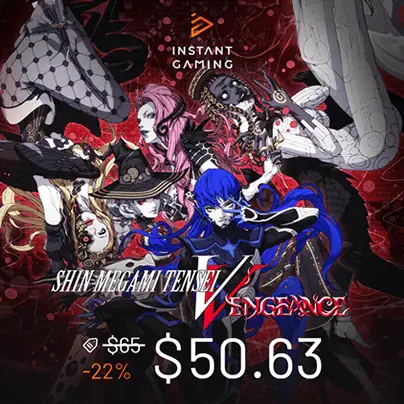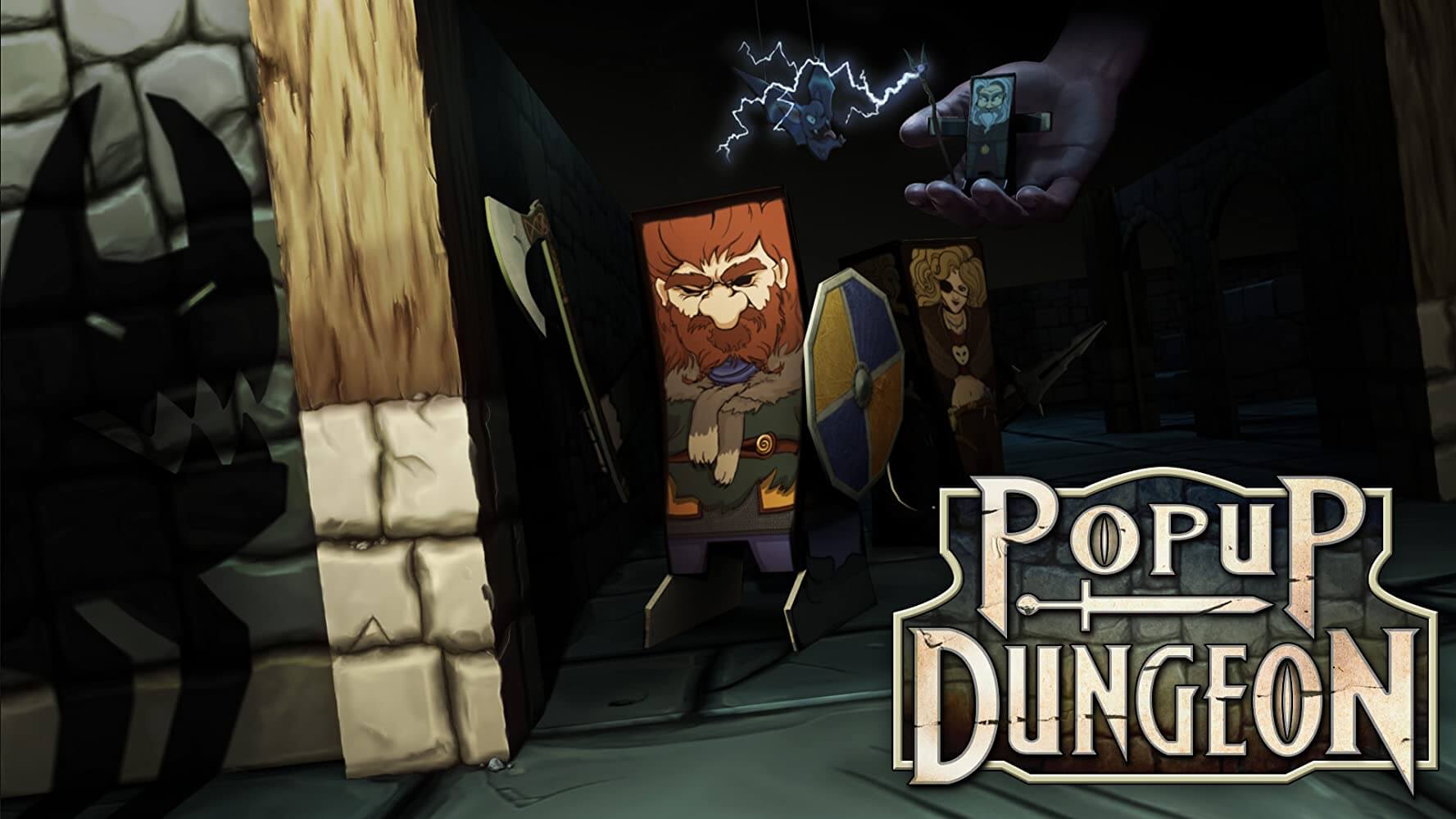Popup Dungeon is a turn-based tactical RPG distinguished by its cardboard-style look and also by its promise of endless customizability and customization. While the potential for modding and building your own content is an important part of what Popup Dungeon offers, I will not be touching upon it here in great detail. It is a nice bonus feature if you like the idea of making your own content, but there is no guarantee that there will be any additional content at the point where someone would like to play it.
From a structural perspective, the game has a fairly straightforward, but extendable core. The game alternates between dungeon/battle environments and story/skill check situations. The dungeon/battle environment part of the game is extremely straightforward. There are sometimes interactable objects, usually some treasure chest or another, however, there is little to do beyond admiring the specific digital cardboard environment.
The story/skill content is essentially how the game presents the world and environment around you. It is pretty simple in its presentation, but this simplicity allows for a pretty wide array of different stories, with two sample campaigns (a sci-fi one and a fantasy one) showing off the breadth of storytelling possibilities available.
The battle is not a simple affair. You are able to bring a party of anywhere from one to five preset characters, and the game scales based on your party size. Characters take turns and have action points based on their speed stats, have movement points that both interact with and are separate from your action points, and have a selection of ability cards that they can use on their turn.
Battles typically take place in tight quarters with destructible terrain, so being able to maintain chokeholds or make the decision to spend some action points to destroy said chokeholds is frequently relevant.
The characters mostly cover sci-fi and fantasy archetypes. The game does venture into memes or jokes with some of them, including allowing characters to play dogs or cats, an internet troll, or a robot DJ. Each character does very different things, and finding a group that works together, or finding a way for your thematically tied group to succeed is an interesting challenge.
Each character has varying levels of a wide range of stats, a set of core abilities, and various equipment that impacts both these abilities and their stats. Most stats affect how much damage you do with various types of abilities, but other stats impact how much damage you can take or will take, how fast you are, and how likely it is that enemy status conditions will affect you.
Monsters are similarly varied and are built on much the same system as the characters though without the specific gear-based customizations that player characters feature. Thematically they represent a variety of science fiction and fantasy archetypes and tropes, though many of them are clearly meant to be either a meme or a joke. Examples include a half-centaur (clearly a person), the t’owl, and Space Lincoln.
The habit of making almost everything a joke, meme, or reference colors almost the entirety of the game. The main wizard’s tower scenario is replete with it, though it is less frequently found in the sci-fi scenario and (especially) the fantasy one. However, it is so intertwined into the characters, monsters, and gear that it would be difficult to play it straight outside of carefully curated custom content.
The story content is presented in a series of cards that provide generally steady forward momentum. Each card leads into another card or three and the individual cards selected to serve as a tactical representation of the decisions the player is making. Some of these cards lead into the combat encounters noted above, while others feature skill checks using digital d20 and modifiers based on whoever is most skilled at the challenge related to the check.
Most of these encounters are designed well and provide a bonus or penalty based on success or failure. It is unusual for a specific encounter to completely cut off the ability for the story to progress.
Both the sci-fi and the fantasy campaigns feature situations where you could move beyond the simple choice structure to instead select from a menu of repeatable options. In the fantasy campaign, this is a city, which you visit for a bit of time near the end of the game. Each location had the sort of options you would expect from the city. A weaponsmith featured gear you could purchase or upgrade, the tavern had interesting characters to meet and interrogate, and the bookstore provided access to secrets to help you resolve your quest.
The sci-fi campaign further showed the potential of the system by having a complete ship combat system. The combat system was fairly abstract but still did its job, effectively providing the feel of ship combat and showing off how far the system could be pushed to create a wide variety of scenarios for players to explore.
As for character progression, experience and levels aren’t kept between campaign or levels of the wizard’s tower. Instead, you are awarded a gold meta currency which you can use to get special items called charms which provide party-wide bonuses when equipped.
Failures and Limitations
Because of the designer’s desire to make the system as flexible as possible, PopUp Dungeon ends up feeling a bit generic. The story parts have pictures associated with the setting, but they rely a lot on text and descriptions to convey a sense of where you are and what you are doing. This method feels like it is not quite enough and contrasts a lot with the generally sharp graphics found in other parts of the game.
This allows for a lot of customization options for scenario builders, but it also makes obvious how linear the game is, popping the illusion of choice that other games provide. I wonder if the reason why these mostly empty dungeons exist is that they want you to feel more like you are in the setting. With them, you are wasting time wandering through environments that don’t matter, but without them, you would have no idea what the designers intended for your environment to look like.
The gear-based character customization options are quite limited and mostly involve trivial decisions. Most of the character stats come down to “this is how much damage the character does.” Because characters generally have a limited number of abilities focused on specific types of damage, you just end up picking gear that upgrades the stats that are relevant to the specific character. Sometimes your heroes can learn new abilities, but oftentimes it’s obvious as to which choice is better.
In many ways, this is reflective of the fact that all of these choices are ephemeral. The campaigns aren’t very long, and by the end of them, your characters will feel potentially overdeveloped with useless abilities and little to look forward to beyond steadily increasing stats. Now, this could very easily be seen as a plus for those who prefer shorter, more bite-sized content, but for anyone who prefers to develop their characters over a longer period of time, this can feel distinctly unsatisfying.
This somewhat-flat character progression contributes to battles feeling repetitive. It doesn’t help that there isn’t a lot of variance between battles, especially since there are a lot of them. Most end up being quick brawls, as characters from both sides go down over the course of a few rounds until one side has won. Tactics games that are able to create very distinct battles tend to have alternate victory conditions or a wider variety of environmental effects. You defend a specific location for a certain number of rounds, protect non-player characters, escape to the far side of the board, or need to keep a particular enemy alive. Popup Dungeon never changes the objective. You always just want to quickly kill the enemy and it gets old.
Humor is very personal, and I am sure there are going to be people who find this game hilarious. However, I found Popup Dungeon’s brand of it to be quite boring and distracting to the point where it made me less inclined to play. It also made me wonder if they were trying to use humor to distract somewhat from the genericness. Whatever the goal, I feel it is not funny now, and with how relevant the jokes are to the last couple of years, it will become increasingly less funny with time.
Achievements
With all that being said, the overall Popup Dungeon experience is a mixture of fun and admirable. As I was going through the game I couldn’t help but think of and get excited about all the genres that it could be used with. The developers have already presented a way you could implement the system to make a dating system, but I am particularly excited about using the system to make a superhero game.
It feels like the game system would both allow and be particularly suited for superheroes. It is easy to see other areas where this would be the case as well, to the point where it makes me wonder why they chose the showcase genres that they did
Battles are challenging to figure and fairly interesting before the repetition sets in. On a strategic level, this can be attributed to a large number of different characters available and the distinctness of their kits. With 25 different available characters, it is easy to mix and match characters for different runs, seeing how their kits work together and how they can defeat combat encounters together.
I suspect it would be a little bit less fun to use the same characters again and again, but with that many options, there is virtually no reason to ever do so. On a tactical level, managing cooldowns, action points, terrain, and various control abilities and reaction skills make for a nuanced decision space. I do wonder if the game would have benefitted from having slightly longer and less frequent battles to let players really try out the system and experience its intricacies before getting worn down by the repetition.
While I mentioned how the Popup Dungeon felt a bit generic, the developers are successful in creating thematically tight ability sets. The Wizard’s ability set does a good job of conveying this.
On first look, the frostbolt and lightning bolt effects feel pretty similar. Each is a single target long-range damage effect with some small variations intended to mix things up. Frostbelt has a slightly longer range and a lower action point cost while lightning bolt has a higher damage ceiling and damage variance.
Further examination reveals how each one has specific things that convey a sense of theme. Frostbolt is blocked by line of sight, as one would expect for a bolt of frost that you are launching from yourself, and causes a big penalty to movement for a round. The lightning bolt’s damage variance actually represents the wild uncontrolled energy of the bolt and its ability to ignore terrain and combatants makes sense for something called from the sky. Each character has a whole selection of these abilities available that makes them distinct and interesting.
I fully expect that players who dive deeply into the game will have a lot of fun figuring out which characters work well together, which party sizes are optimal for specific levels or campaigns.
Conclusion
A lot of what Popup Dungeon has to offer is promising, yet makes me wish that they had made slightly different decisions in character progression and battle length. I recognize that most of the things that I had a problem with are going to end up evoking a very different reaction for different gamers. Overall Popup Dungeon is good. There is a lot to like, but the things that I found to be limitations are items that are going to prevent me from getting as deeply into the game as I would like. As it is, this is a game I will return to every once in a while to enjoy in small campaign-size doses, but it is not something I expect to get dozens or hundreds of hours of play out of like I do from my favorites.










good review